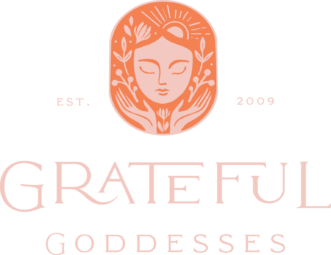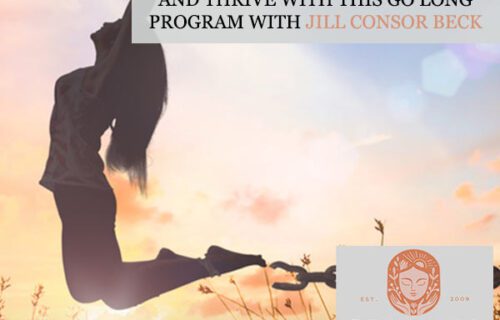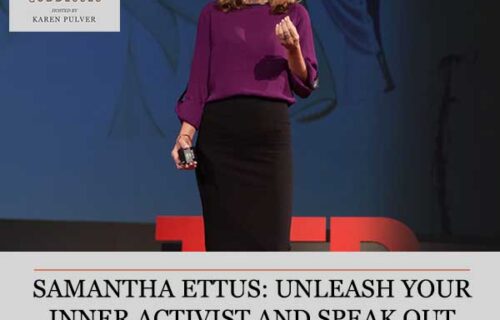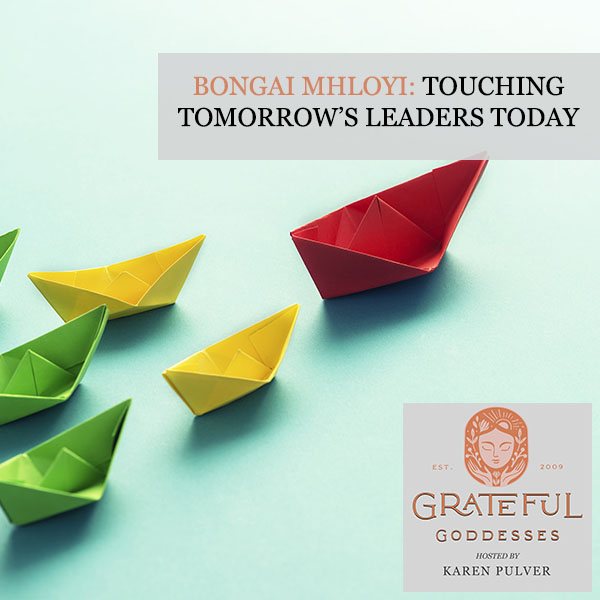
Bongai Mhloyi: Touching Tomorrow’s Leaders Today
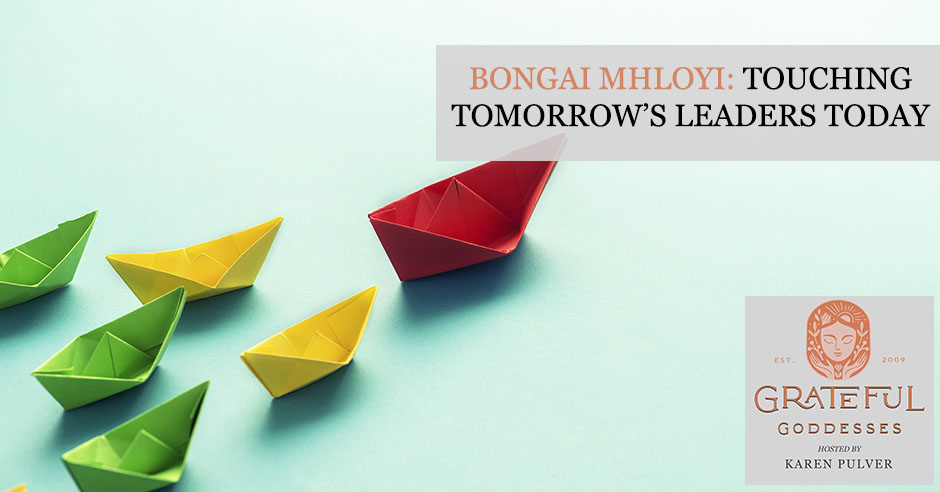
Bongai Mhloyi is a superwoman! Faced with her own personal experience in her family, Bongai has seen firsthand the result of child marriages. She left Zimbabwe to study in the US, but soon became a social worker who’s on a mission to empower young girls to live the life of their dreams. Bongai realized that by raising funds for girls’ education, they could escape child marriages and learn skills to lead productive lives. This advocacy led her to create the nonprofit organization, American-African Youth Leadership Foundation (AAYLF) in 2010. In this episode, Bongai is joined by Moreen, a 30-year-old woman from Zimbabwe who has been positively impacted by AAYLF and now leads a productive life as a mother and entrepreneur. Join in as Karen Pulver and Goddesses get Bongai to share her stories of courage, determination, and empowerment in order to make a difference!
—
Watch the episode here
Listen to the podcast here
Bongai Mhloyi: Touching Tomorrow’s Leaders Today
Challenging The Rigid Cultural Norms That Promote Gender Discrimination And Child Marriages In Zimbabwe
Our guest is Bongai Mhloyi, Miss B. She was born and raised in Zimbabwe. She came to the USA with her husband to attend college with the thought of returning to Zimbabwe right after graduation. Well, she is still here. She knew from a very young age that she had compassion for people, especially girls. The reason is as a young girl when she was about 11 or 12, she witnessed a child marriage in her family. Her 75-year-old grandfather was living with a girl the same age as her and she was his wife because her father had married her off to her grandfather, to Bongai’s grandfather, in exchange for ten cows. The terror in her face did not need any explanation. In 1990, Bongai got her BA in Social Relations and then a few years later, she got her MA in Special Ed.
After working in social services for more than twenty years, she started a nonprofit organization, American-African Youth Leadership Foundation, AAYLF in 2010. She wanted to work with American youth as well as youth in Zimbabwe. In Coatesville, Chester County, she teaches young girls etiquette social graces, leadership skills and more. She gives them the tools necessary for their success. AAYLF helps under deserved and impoverished communities in Zimbabwe by empowering vulnerable girls, GirlChild orphans, through education and social skills. They give scholarships to girls that they can stay in school instead of getting married off to much older men. AAYLF goals are dedicated to ending childhood marriages through education. They believe that no girl should be robbed of her childhood, education, health and aspirations. AAYLF funds orphans and at-risk girls from the poorest sections of Zimbabwe so that they can attend school.
Their program will cover all the costs including tuition, books, transportation, nutritious meals and in some cases, they will provide housing so that girls can escape childhood marriages and further their education while living in a healthy environment. AAYLF provides full funding to girls to stay in school and attend college so they can escape the threat of child marriage and have the opportunity to live an independent, self-sustaining life. Since 2010, they’ve impacted more than 250 girls. Bongai is very happy with her work and she is always looking for partners to sponsor the girls. If you sponsor a girl for one year, you will get her picture, her story and her school progress throughout the year. It costs a $25 monthly donation to keep a girl in high school for a year. $100 will pay for one semester for a high school girl and $300 will pay for a whole year for high school for a girl.
$500 pays for college tuition for one semester, $1,000 pays for a whole year of college and $350 will pay for one semester of culinary school. $1,050 will pay for a whole year of culinary school. They hope to challenge the rigid cultural norms that promote gender discrimination and child marriages in Zimbabwe. The motto is “Touching Tomorrow’s Leaders Today.” Visit their website www.EndChildMarriages.org to get more info on their work and how you can get involved.
—
Welcome, everyone, to Grateful Goddesses. I have the privilege and honor of speaking with this beautiful young lady, Moreen. She is in Zimbabwe and her story is absolutely incredible. We’re here to know your story. Moreen, can you tell us about you and how you are so resilient and here now to talk about your story?
My name is Moreen and I’m 30 years old. I’m a recipient of AAYLF by Miss B. It’s an organization that helped girls escape child marriages. That helped girls go through school. I was very fortunate to be part of the AAYLF. It took me through from high school up to my tertiary education. I’m now a business management degree holder. I’m married and I have two kids. I started being an administrator at a private wedding venue but I’m now an entrepreneur in kids closing and interior designing. AAYLF impacted my life in a great way. I’m thankful for what they’ve done in my life. They changed my life completely.
They gave me the future and everything that I wanted. Many of us in Zimbabwe don’t have the opportunity to excel, do what we want, be who we are and do great in life because of some challenges that we face here in Africa. I’m grateful for this organization. AAYLF Is doing a great job to help other girls. I’m also hoping to sponsor a girl in high school because they appreciate it. I saw the importance of sponsoring and giving a girl a future and hope. I’m very thankful for the organization for doing an amazing job. Look at me, I’m now an entrepreneur.
You talk about challenges when you were younger and you talk about your dreams. Can you go back and talk to us a little bit about those challenges for young girls? What is it like for 10, 11, 12-year-old girls in Zimbabwe?
The challenges that faced these girls is heartbreaking. Sometimes when you don’t have the money for school fees, some parents can opt for getting married off to some old guys. They make you do being housemaids and do all sorts of odd things if a girl needs something that will help pay to escape these things. It’s quite difficult when we face challenges like money problems. In my situation, both of my parents were not working. They were struggling to put me to school. That’s when the organization came in to help me. The Zimbabwean and African girls faced so many challenges. Being married off, going to it at an early stage some others can be child-headed families at the age of 9 years or 14 years depending on the situation. AAYLF is helping those girls escape those hassles and challenges.
When you were 9 or 10, did you see this happening around you? In your family, you said both your parents didn’t work. Were they considering doing that? Looking back, was that something you witnessed when you were younger?
It does not make a person any less because they are a girl. Share on XSome of my family members get married at the age of 12 years to some 50 years old guy. My other cousin was sent to go to wait to be a maid. I experienced those things. My challenge was my parents were not saying, “We are struggling to get you into school. It’s better for you to stay at home.” I thought I was now vulnerable to the certain situation of getting married off or doing all sorts of things like drugs or anything so that I will be pre-occupied because I was not going to school at that time. Those are the challenges that I faced when I was at that age.
It’s incredible empowerment that the organization has enabled all of these girls. Bongai is an incredible woman. We’d like for you to join us, Bongai, in this conversation. What you are doing is absolutely incredible. Can you share with us your story?
Thank you very much for giving me this opportunity to come here and share my story. My name is Bongai Mhloyi. I am the Founder of the American-African Youth Leadership Foundation. I was born and raised in Zimbabwe and as Moreen was saying, growing up, I also witnessed child marriages in my family. I witnessed it with my grandfather, my mother’s father. He was 75 at the time. I was about 11 or 12. We saw this young lady coming to stay at my grandfather’s house. My sisters, I and my brothers were all wondering, “What is this girl doing here?” We thought she’s our relative. Only to find out that she was married off by her parents to my 75-year-old grandfather. She was about the same age as we were. I saw her coming to stay with my grandfather. My mother would tell us all these big facts that her parents married her off.
As a child, we all know what 11-year-olds, 12-year-old girls want to do. All we need to do is to go to school and play like any normal girl will do. This young girl was not allowed to play outside with us because she has to take herself as somebody’s wife but she is a child herself. As we were playing outside, we were playing and jumping rope and playing with our dolls. My grandmother, my mother’s mother would call her back in the house because she could not do what we were doing as children because she’s a married woman. She has to come back and she would be crying all the time. That broke my heart and witnessing that is not something that you can easily forget.
Bongai, what you are doing is incredibly honorable. We have lots of questions for both of you. I’d love my Featured Goddesses to join us now to take part in this incredible discussion with you about empowerment. We have Alyssa and Camille. Alyssa, would you like to start?
I’m so grateful to talk to you guys and thank you for being here. Moreen, especially you. I knew we’ve got a big-time change, you being in Zimbabwe. Bongai, I wanted to talk to you. Continuing on this journey, what you witnessed with your grandfather and this young girl is unbelievable, especially for people here in the US to hear stories like this. I don’t think many people are aware of how young these girls are when they’re getting married. To your story, take us forward of you coming to this country. How old were you and how were you able to, for lack of better words or understanding, escape that faith of being married off and then come here to the US?
It’s a very long story and I will try to shorten it as much as I can. The good part about this story was the girl ended up running away two years later. Thank God she didn’t have children with my 75-year-old grandfather. She planned to run away and she was telling us. We promised that we’ll never tell our grandfather that she’s planning to run away, which we never told him. She runs away. We don’t know where she went. Up to this day, I never knew what happened to her. In my own family, my mother and father had eleven children. We were eight girls and three boys. I would say, I consider myself to be lucky because we’re not rich, we’re not poor but my mother and father were pro-education.
They didn’t want to do what the other people were doing to the girls and sent them off to older men. My father and my mother sent all of us to school. My sisters and my brothers all got a higher education. I wasn’t married off. Nobody picked my husband. I met my husband by myself. We got married when I was in Zimbabwe. We had our fifth child when I was in Zimbabwe. Fortunately, my husband’s brother was here in the United States. He arranged for my husband to also come and join him to get a degree which he did and I followed as well.
We both went to school. I got my Bachelor’s degree and Master’s degree. My husband did as well. As I finished my education, instead to get a professional job, I went to school for social work. I never forget that story and these children because I also witnessed some of my friends, the friend that I went to school with. Some of them were dropping out of school because of poverty in their families. Some were married off because of poverty. Most of these people who married off their children are not because they want to but because of the situation in the cultural belief in their rural areas in Zimbabwe. They think that if you educate a girl, you are wasting your money. You need to educate a boy so that he can stay home.
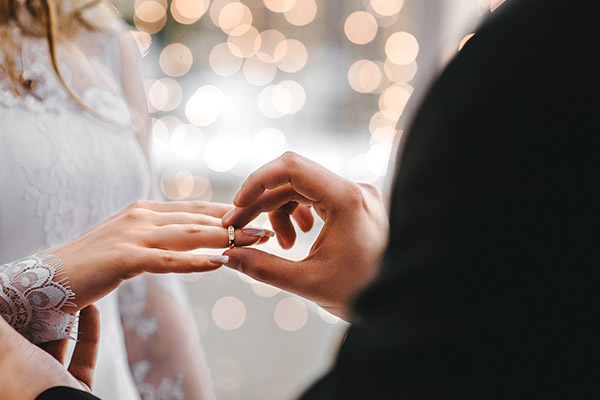
He can get a professional job and carry on the family name. If it’s a girl, once she gets married, she’s off to another family. A lot of families still believe that they need to educate your boy. Just because they were born as a girl, that didn’t make them any less a person, it doesn’t make them less than a boy. They are as good as a boy. From a very young age, I knew in my heart that my passion is to work with people, especially girls. As I was getting empowered, I wanted to empower other people. I was working and instead of spending my money, I would send money to people that I knew and I grew up within my community in Zimbabwe that I knew were struggling to send their children to school.
I was sending them the school fees and keep their children to school, especially the girls. As time went on, I figured, “Since I’m impacting these girls, why not open and start a nonprofit organization?” In 2010, that’s when I registered my work as a nonprofit 501(c)(3). That way, I can do it legitimately. I registered in Pennsylvania, where I live. I can do fundraising events and solicit donations so that people can help me because they need it so much. You can never do it by yourself, so you need other people to help you. This African quote that I like a lot, I always talk about this. It goes like, “If you want to go fast, go alone. If you want to go far, go with others.”
I want to make my story known. Tell everybody that can give me an ear to listen and let’s go together. That way, we can impact as many girls as we can. We can see Moreen here how she is now. She’s an entrepreneur. If you follow this is going big, knowing her story. She says her parents were way older, they were not able to send her to school. If we’re not able to send her to school, her life now could be in darkness. Can you imagine, if she didn’t have an education, she married off to a 70-year-old guy. By now, all the guys that married these young children died before the girl is even old enough to be an adult. She is in double jeopardy.
She’s left alone to raise these children. The guy is dead. She has no skills, no education and no job. How is she supposed to support herself and support these children? That’s why it’s important that we do as much as we can to help these girls so that they can be independent. Of course, we want Moreen to stay married but God forbid, if something happens, she’s working, she can support herself, she can support her children and she can send her children to school. Another thing that I like is that if you educate a girl, you better believe that you are educating a generation. In Moreen’s case, we educated her. We know for sure that she’s going to educate her children and make sure that her grandchildren will get an education. The cycle of poverty is broken right there. We broke it. She’s going to continue educating her children and her children’s children. That’s one good thing about that.
What a story. Moreen, I’m so curious to learn how did you find AAYLF and Bongai?
I had a friend in high school. One of my friends is the one who introduced me to the organization. I took the process of going to the teachers. There was one teacher who helped me so that I’ll be part of AAYLF. That’s how I found AAYLF. I was very fortunate to find AAYLF and help me to go through school.
That seems like it was a very fortunate introduction for you and certainly changed your life, your children’s lives and as Bongai said, generations of women to follow. As I said before, I’m so happy to meet you both and for you guys to be able to share your story on our show.
Camille, one of our Featured Goddesses, has a 12-year-old daughter. I can imagine, Camille, what you’re thinking. Can you share?
Thank you so much for sharing your story. Not only can I not imagine it for my 12-year-old daughter but there are many times in the news, you’ll see different girls here that are trafficked, kidnapped or settle out of debt with drugs involved or so on but still, it’s not something that’s out in the open that’s accepted. That’s considered part of the everyday culture as far as your grandfather being able to be married to someone openly as a twelve-year-old girl. I’m curious, what was your relationship like with your grandfather after that? For a kid, it’s definitely criminal. When she was brought to your home, you mentioned what it was like for you and her relationship. I was curious, how does that change as far as with your parents? Did they ever address it at all or even with your grandfather especially after she ran away?
Growing up, this is something that we see not on a daily basis but it’s quite common. When it happens, it’s not a shock. Sometimes, you’re not shocked that it’s happening in your family but it’s happening next door and in the next community. I grew up seeing this but I never thought that it was going to happen in my own family especially knowing that my parents were against that thing. Seeing my grandfather doing that was a shock but it didn’t change my relationship with my grandfather. I couldn’t believe that he would do something like that. Thinking about that, it grossed me out. I’m like, “How in the world can this girl go and sleep with this old man?”
'I knew in my heart that I was to work with people, especially girls. I wanted to empower them and other people.' - Bongai Mhloyi Share on XYou can imagine, you come in and have a twelve-year-old girl. Even somebody who is 50 years old thinks that they are so old, they don’t even know anything. For a 12-year-old to be in the same room with a 75-year-old man, I couldn’t process that myself. We were asking our mother that, “Can he at least give this young girl to his own son who was a little bit younger?” I think he was 30 years old at that time. My grandfather would say, “No. I’m the one who took my ten cows and get to her family. She’s mine. I’m not giving him to my son.” My mother said they tried to negotiate with their father to give this young girl to their brother, who was a little bit younger but their father didn’t want that to happen.
That’s why she said there’s no hope here for me. She was talking to us and said, “I want to get out of here. I don’t care where I go but I just need to get out of here.” We said, “Go ahead. We’ll help you.” As far as my relationship with my grandfather, it stays the same. At that age, I couldn’t process especially for my grandmother because my grandmother welcomed her. You have to remember, this was a norm in their generation. It wasn’t something out of the ordinary. When you think about it in this time and age, it’s abnormal but at that particular time, in that area, it was something normal. My grandmother took her and treated her like she was treating us. Remember, we were about the same age as this girl. She took her as her granddaughter and she will do whatever it takes to make sure that she’s comfortable. When it comes to her sleeping with my grandfather, there was nothing else she could have done. It had to happen because that’s what was there. She had to do that.
It’s heartbreaking thinking about it. Thank you for sharing.
Myself at twelve years old, I still wasn’t a woman. I didn’t get my period until much later even so. Some of these girls haven’t menstruated yet, right? I don’t mean to be blunt but they’re still children.
They are still children. I also remember I shared it with you, Karen, before that, I got my cycle at a later age. I was 12 or 18 when I got my period. This girl, let’s say, was in the same situation. She’s supposed to sleep with a person and she’s not even mature enough to sleep with anybody at that age. Some of these girls ended up with sexually transmitted diseases. They ended up with all sorts of health issues because of what they’re going through with this old man. They are not in a position where they can say no because they’re still very immature. They don’t even know how to think for themselves. I think about some of the girls that I see now, at the age of twelve, you still need to be reminded to wash your underwear. You still need to remind her to brush her teeth before she goes to bed but now, she has to act like she is a grown woman. It’s heartbreaking. It’s a devastating time but it’s still happening.
Moreen, can you share with us your experience when you started the program? I understand not just education but also Bongai, you mentioned etiquette and teaching the girl skills. Moreen, if you can share with us perhaps Bongai from your perspective, what you provide for the girls.
When I joined the organization, AAYLF, I also attended some etiquette classes with Miss B. I learned a lot from that. Some of us were not exposed to some of the things. We were taught how to dress and how to eat, everything. Those kinds of things can help a girl to see what is important in life. It can help a girl to choose a brighter future from knowing those little and simple things. AAYLF is not only helping girls putting them to school but they are teaching them some skills. I learned a skill to be an entrepreneur. I learned it from AAYLF. When I finished school, I want to stay as an employee but because of AAYLF and the etiquette that they equipped us with, I saw a bigger picture in front of me. I wanted to be my own boss. I wanted to start something for myself to be an employer like helping other people to do something in life. AAYLF impacted in a big way in my life.
You own a children’s clothing store.
I am in the capital office in Zimbabwe in Harare. The business is booming. There are a lot of people who want to buy things for their children. I’m also doing interior design. I love interior designing. I’m doing a little bit of something into interior designing. It was something which I like. It’s my passion. It’s doing very well.

Bongai, there’s an African proverb that’s on your site that says, “You are one person but to that one person, you are the world.” Can you share with us, Bongai, besides education that you teach the girls like what Moreen was saying but from your perspective?
Besides putting these girls in school like Moreen said, here in the United States, I mainly focus on teaching etiquette, social graces, and leadership skills to the girls that I work within my local community but I also check for those programs to the girls in Zimbabwe. It’s more important for me to teach the girls in Zimbabwe, as Moreen said, it forced all these things. A lot of girls don’t even have an internet connection. They cannot go on the internet and research and find out what’s going on in the world.
I make it a point that the girls that are in the program or anybody who wants to come when I do these workshops, we teach them how to carry themselves, how to present themselves when they’re amongst other people. We teach all kinds of etiquette like dining etiquette, business etiquette, leadership skills and how to answer the telephone. We teach them how your attitude can either break you or make you. We teach their personal hygiene and nutrition skills so that they know whatever you put in your body, it’s going to make or break your body. We teach them all kinds of things.
We want to make sure that when they finish school and they are grown women, they’ve got the tools they need so that they can be able to take themselves out there when they are entrepreneurs like Moreen. When they are bosses, they know how to talk to people. They know how to treat other people. We want to make sure that they know that they have to mind their behavior around other people. It’s all about how you behave around other people. The world doesn’t revolve around you, there are other people that live in the world with you.
Education in itself but all of those other skills, even about attitude, that’s amazing.
Bongai, I wonder, is it a challenge bringing the mission of AAYLF to these rural communities and finding girls and spreading the word of what you do or it’s a little bit of both? There are so many young girls and it’s hard without the funding and the resources to help all of the girls you want to reach.
It is a big challenge to find resources to be able to help every girl that we need to reach. Getting the girls is the easy part. It’s not a problem. I have hundreds of girls on the waiting list but getting sponsors and resources to put all of these girls in school, that’s where I get the biggest challenge because it takes money, of course. When you think about it, I can say, “$300 a year is not a big deal,” but for people in Zimbabwe as an African country, it’s a lot of money. As far as getting the girls, Rashai that we work with in this particular community, she knows all the girls that live in the area because most of them come to the school and she knows the parents in the local areas.
The people in the community, especially the mothers know this teacher. Every day, they come to her crying and saying, “Can you please help me? I have a daughter. My husband is about to marry her off and I cannot send my child to school.” This is the challenge that we get every single day and we cannot take everybody. For me, I have to wait until I get a sponsor and then we get one girl from the waiting list we put in the program. We know that she’s safe now but there are still a lot of girls that are on the waiting list that we are waiting for somebody to wave their magic wand and say, “I’ll give you a grant. You can take all the girls and put them in school.” That’s our biggest challenge. It’s getting the funding. My other challenge is to get the word out. I do appreciate parents giving us this platform to share Moreen’s story so people can hear. At least people are aware. Once they are aware, they can choose to do something about it. That’s one of my biggest challenges. How do I make people aware that this is going on and this is what we need to do for these girls?
That is the challenge especially trying to educate people in this country about something that’s happening half a world away. The work that you’re doing is amazing. Thank you for sharing both what you do and the challenges of making it happen.
Camille, do you have any further questions?
'If you want to go fast, go alone, if you want to go far, go with others.' - African proverb Share on XAs far as the different challenges that you have in getting sponsors and so on, what other things can we do to help you as far as getting more resources that you guys need, especially now with COVID? I wonder if there are any changes needed there that are different challenges that you guys have very better.
Now we are in the corporate world and you can think about it’s difficult here but at least we can be on the internet like we are doing now. Over there in Zimbabwe, their biggest challenge is that the internet connection is not like we are doing here. It’s not easily accessible. You have to pay to get the Wi-Fi bundle like Moreen. What do they call it, Moreen, that you have so you can be on the internet?
It’s a MiFi. It says MiFi internet connector.
They have to pay for it every month so that they can get the data they need for them to be able to see online. For our girls, the whole country in Zimbabwe is on lockdown because of the high number of cases of COVID there. They put a lockdown policy from January 1st, 2021. I don’t know what the update is going to be. The girls were now forced to stay at home. Even if they are at home, they still need to do their schoolwork. You can imagine they need the Wi-Fi bundles for them to be able to be on the computer or their phones so that they can continue with their education and do their homework.
That’s another challenge that we go through. I have to send some money to the teacher there so she can buy the Wi-Fi bundles for the student, especially the high school girls that need to be on the internet. We had to send the money to get the Wi-Fi bundles so that they can stay connected to the teachers and with their schoolmates and continue to do their schoolwork. A lot of girls and a lot of other students, if they don’t have the Wi-Fi bundles, they’re not doing anything. They’re just sitting at home. If they’re sitting at home with nothing to do, that even puts a girl at higher risk of getting married off because the old men are around. The girl is around. She’s not in school. She’s more prone to men coming to her and doing all sorts of things. At that young age, a lot of the girls are not in a position where they can say no or defend themselves. They are even at a greater risk at this point. We pray that they’ll go back to school soon.
Can you tell us about the work that you do for young girls here in this country? I know you work with people in your community and in the US generally.
In my local community here, I start from age 5 all the way up to 19. As I said, I teach etiquettes, social graces and leadership skills. I group the girls into three different groups because I cannot put a 5-year-old with an 18-year-old. We group them according to age. The first group is aged 5 to 9. The next group is aged 10 to 12. The next group is the teenage group. We teach them different skills. I was teaching my teenage group. The teenager learned a lot of things. Now that they are young adults, they are getting ready to go out there in the community so we teach them financial literacy. We teach them dining and business etiquette.
We teach them all the business things they need. We teach them how to go through an interview, how to dress and speak properly when you are in an interview. We teach them public speaking and all kinds of things. In the middle group, we teach them something but if it’s a little girl, we don’t go too far because they feel the yarn but we stopped. The little ones, the 5-year-olds to 9-year-old, we teach them what they can understand, what they can comprehend at that age. Normally, it’s the best etiquette skills like thank you, excuse me, you’re welcome, brushing your teeth in the morning, making your bed when you wake up, washing yourself, small things that they can understand. As they grow older, we keep increasing. Basically, etiquette skills, social grace needs, how to be social out there, to be able to mind their behavior around other people how their behavior can affect people around them.
It’s amazing and incredibly empowering I would think for these young girls and their families are so grateful.
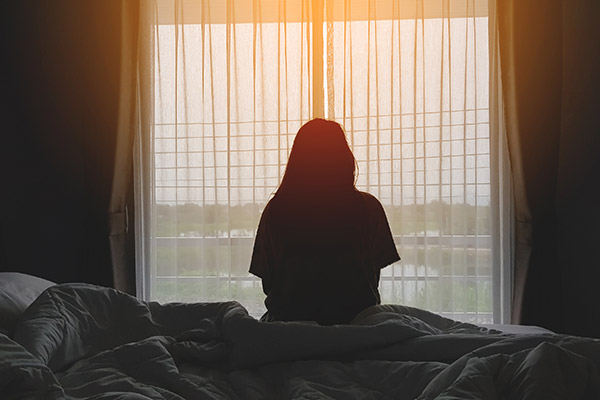
I appreciate it, they do. Before COVID in 2020, I usually teach classes in the summertime when the girls are out of school. It’s usually a 6 to 8-week program in the summertime. In 2020 because of COVID, we couldn’t meet in person. We started doing it on Zoom and it went well but we still taught the same things that we would teach in person but we were on Zoom. It was nice because I was able to invite my Zimbabwean girls to join as well or those who were able to join on Zoom, they’re with us.
I was thinking that with the internet and Zoom, if that could be brought to the girls in Zimbabwe, how great it’d be for those girls to have a virtual penpal.
I have one of the girls here that stay on Zoom with one of the girls in Zimbabwe. They became friends and I will connect them on Zoom every two weeks. The other girl in Zimbabwe, she’s in school. When she’s in school, she’s not allowed to have electronics like telephones and cell phones and stuff. They will wait until she’s out of school. When it’s holidays, they will be connected. They developed a good friendship. They talk all the time on Zoom.
That’s great. Moreen, you could be a mentor to so many of these young girls. I’m sure you already are but how great for them to hear your story, to see how incredible you are and how successful you’ve been.
Moreen, do you have daughters or sons?
I have two sons. I don’t have daughters.
Moreen is an amazing testimonial to the work that you’ve done, Bongai. What do you hear from other girls? I’m sure there’s a ton of success stories.
I have a lot of success stories but Moreen is my favorite but I’ve never had that stories. I have one girl that also was in the program. She graduated a couple of years ago. We started with her when she was in high school like Moreen and she finished high school. She went to college. She graduated and met her husband when she was in her last year of college. Her husband already went to college also. He graduated one year before she did and then they got married. I was supposed to go to the wedding in April of 2020 but with the COVID situation, she postponed the wedding thinking that COVID by June 2020 will be over but it didn’t happen. She ended up having a small wedding because I said, “Go ahead and get married.”
She went but the big wedding will be coming whenever COVID is over. She is expecting their first child now. Her husband is working. She’s not working because she’s expecting her child. She goes back when she’s done. That’s another success story. I have another girl that we also took through high school. She went to the university. She learned languages. Now she’s teaching Chinese. She’s working as a translator. She moved to Mozambique, which is a neighboring country. She’s teaching English-Chinese and Chinese-English in Mozambique. I saw many other girls that are police officers, some girls that are school teachers and some girls started their businesses.
I have one other girl who is a chef at a big restaurant. She went to culinary school. I have a lot of success stories. I can’t complain because since I started in 2010, I have most of them that are success stories but I had one girl that when she was almost through high school, got pregnant and got married. The good thing about it is she wasn’t married off. She chose to go with this boy and they got married. She’s married but it was her choice that she’s married to somebody that she chose herself.
If you educate a girl, you better believe that you are educating a generation. Share on XIf our audience would like to give donations towards your cause or contact you, how can they do that?
They can contact us on our website, which is www.EndChildMarriages.org or you can simply call me. My phone number is (484) 356-8935. You can send me an email, it’s Donate@EndChildMarriages.org. All those three channels you can reach me. It’s very easily accessible.
On behalf of the Grateful Goddesses, we will be sponsoring a girl. We will be doing that. It’s our hope that our audience will feel inclined to do that as well even if it’s a monthly donation or a small donation but of course, a larger one can do so much to impact these girl’s lives and change, as you said, generations to come. We are grateful to you and your work. Moreen, thank you for sharing your story. That will help our audience to understand the difficulties and challenges that these girls are facing. Thank you for joining us on Grateful Goddesses.
Thank you so much for having us. We appreciate your sharing our story.
—
Welcome, everyone, to Favorite Things on Grateful Goddesses. We’re here with Moreen and Bongai and we’re so excited that they’re here joining us. I’m honored and grateful for all the work that Bongai is doing. Favorite things. I brought along a photo of my daughters. It was a beautiful day. We went on a boat and I believe this was in Mexico. We had the privilege of going on this boat one day. Some friends asked us and they were being young, teenage girls, looking at their phone, looking on their social media and they let me look over their shoulder.
I have this as my screen saver because it was a touching moment for me. In preparation for this interview, I was thinking back to my girls when they were twelve. I cannot imagine if they had to be married off like that at such a young age. I’m so grateful that they have the opportunity to choose their life in a sense and not be pulled away from their dreams. I’m impressed Bongai with the work that you’re doing. Alyssa, what did you bring along?
I have to agree. You’re such an inspiration and both of you. I’m so happy to have met you both. I don’t have girls, I have boys. As Karen and Camille know that it’s my birthday. My favorite thing is these beautiful flowers that my sons sent to me. One of them lives out of state and one is here but it is a dreary gray day here in Chicago. The snow is falling. We have had about afoot. To have these bright, beautiful flowers is a special treat for me. I’m very grateful for them and thinking of them. As you do on your birthdays, you think back to your life and you take stock. I’m happy that they thought of me and brightened my day.
You raised them well.
I try. We’re all still a work in progress but so far, so good.
Camille, what did you bring along?
AAYLF equips girls with a bigger picture ahead of them. It is an impactful organization. Share on XI am much like you, I brought a picture of my daughter because she is twelve. I was thinking even my dad, he’s 76. He’s always instilling in me the importance of education, questioning authority and instilling those kinds of skillsets to my daughter. He was making a point of saying, “Have you taught her how to change a tire yet?” I’m like, “She’s twelve.” The idea of it, how lucky she is that she can be twelve. She’s dressed up in a descendant’s costume for Halloween. She’s dressed up like a kid. She gets to enjoy being a child of twelve, embrace it and enjoy all of it. She still plays with dolls and the idea of having to cook, clean and be a wife to someone. Thank you for giving us that perspective of how lucky we have it and how we have to pay it forward to the other women in our lives that may not haven’t.
Moreen, what did you bring?
My favorite thing is this gigantic book. In this book, my sons and I write some little notes where we are coming from, our future plans and thanking God for everything that He has done for us. It’s my favorite. I’m teaching them how to write. One is 7 and the other one is 4. I’m teaching them how to be thankful for what we have. I’m looking at myself being held by this organization, being who I am today because of AAYLF. Thanking God and writing our future together.
I’m speechless. That is beautiful. Something that everyone should be doing but honestly, that’s amazing. Thank you for sharing that. Bongai, what did you bring?
I’m supposed to bring something but my favorite thing is my grandkids. I have two sons. One has two girls. The other one has three boys. My grandkids make my days. Every time I think about them or see them, I forget everything else that’s going on around me. My grandsons live about fifteen minutes from my house, so they come to me every weekend. They didn’t come this weekend because they were not feeling well but when they come, we do a slumber party. We sleep in beds in the living room. We throw blankets around and whoever gets a space to sleep, that’s where you are sleeping. I always enjoy that time with them. They are 4 and 2. The third one doesn’t come here because he’s less than a month old. He was born on January 2nd, 2021. That one stays home with mom.
Thank you for sharing. I’m imagining them making forts with blankets and pillows. That’s what kids do. That’s what all children should be allowed to do and not be forced into doing something against their will. I have to say thank you. We’re grateful to you for the honorable work that you’re doing. Moreen, thank you for sharing your story.
We want to thank you for allowing us to come here and share these stories. Thank you so much.
I know that this will have an impact on our audience, so thank you.
Important Links:
About Bongai Mhloyi
 Bongai Mhloyi was born and raised in Zimbabwe. She came to the USA with her husband to attend college with the hope to return to Zimbabwe right after graduation, but she stayed. She knew from a young age that she has compassion for people especially girls. As a young girl herself, Bongai at age 11 or 12, witnessed a child marriage in her own family. Her 75-year-old grandfather was living with a girl the same age as Bongai and she was his wife because her father had married her off to Bongais grandfather in exchange for 10 cows.
Bongai Mhloyi was born and raised in Zimbabwe. She came to the USA with her husband to attend college with the hope to return to Zimbabwe right after graduation, but she stayed. She knew from a young age that she has compassion for people especially girls. As a young girl herself, Bongai at age 11 or 12, witnessed a child marriage in her own family. Her 75-year-old grandfather was living with a girl the same age as Bongai and she was his wife because her father had married her off to Bongais grandfather in exchange for 10 cows.
In 1990 Bongai got her BA in Social Relations and then a few years later, she got her MA in Special ED. After working in social services for more than 20 years, she started a nonprofit organization, American African Youth Leadership Foundation (AAYLF) in 2010. She wanted to work with American youth as well as youth in Zimbabwe In Coatesville, Chester County we teach young girls etiquette, social graces, leadership skills, and more. They give them the tools necessary for their success.
Love the show? Subscribe, rate, review, and share!
